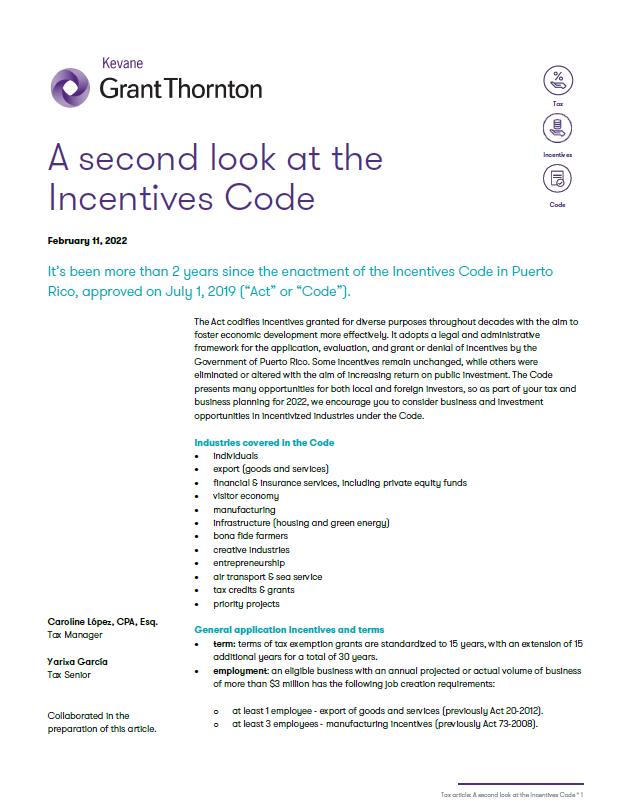The Act codifies incentives granted for diverse purposes throughout decades with the aim to foster economic development more effectively. It adopts a legal and administrative framework for the application, evaluation, and grant or denial of incentives by the Government of Puerto Rico. Some incentives remain unchanged, while others were eliminated or altered with the aim of increasing return on public investment. The Code presents many opportunities for both local and foreign investors, so as part of your tax and business planning for 2022, we encourage you to consider business and investment opportunities in incentivized industries under the Code.
Industries covered in the Code
- individuals
- export (goods and services)
- financial & insurance services, including private equity funds
- visitor economy
- manufacturing
- infrastructure (housing and green energy)
- bona fide farmers
- creative industries
- entrepreneurship
- air transport & sea service
- tax credits & grants
- priority projects
General application incentives and terms
- term: terms of tax exemption grants are standardized to 15 years, with an extension of 15 additional years for a total of 30 years.
- employment: an eligible business with an annual projected or actual volume of business of more than $3 million has the following job creation requirements:
- at least 1 employee - export of goods and services (previously Act 20-2012).
- at least 3 employees - manufacturing incentives (previously Act 73-2008).
The Act allows current grantee holders under Act 20-2012 and Act 73-2008 to submit a grant amendment to request the employment requirement set forth in the Act. The Secretary of the DEDC has the authority to approve said amendments to pursue the objectives of the Act. All other eligible businesses are not subject to employment commitment.
- income tax: a flat 4% income tax rate applicable to exempt income generated by an exempt business. This changes several tax exemptions, such as tourism, which used to have a different exemption on income under previous Act 74 (90% exemption taxed at regular corporate tax rates). Some industries have different income tax rates, such as Priority Projects (18.5%) and Bona Fide Farmers (90% exemption).
- property taxes: there is a 75% exemption on property tax for certain grantees, except individuals and Priority Projects.
- exempt businesses with 2% tax rate: exempt business in Culebra and Vieques and new small and medium sized businesses have access to higher tax incentives (see below). According to Section 1020.01(a)(61) of the Code, a small and medium sized businesses is an Exempt Business that generates an average volume of business of three million dollars ($3,000,000) or less during the three (3) taxable years preceding the current taxable year. To be eligible for these added incentives, said business should comply with these requirements as of July 1, 2019:
- has not commenced operations;
- does not have economic activity;
- does not have volume of business;
- is a new entity; and
- any other requirement relevant by the Secretary of the DDEC.
They enjoy a flat income tax rate of 2% for a term of 5 years and 4% for the remaining period of the Grant. Furthermore, for the first 5 years of their Grant, said Exempt Businesses will have a 100% exemption from real and personal property taxes, as well as from municipal taxes. For the remaining exemption period, they will benefit from a 75% exemption from real and personal property tax, and a 50% exemption from municipal taxes. Note that this treatment is not automatic. It should be requested when applicable.
Tax credits
Tax credits are issued to an exempt business by the Secretary of the DEDC. Credits under the Code are granted to the visitor economy, research and development, purchases of products manufactured in Puerto Rico, and film. The Code mandates that the Secretary of the DEDC adopts regulations to adopt the processes for the issuance of tax credits. The criteria used to issue tax credits to maximize economic impact, return on fiscal investment and performance may include: (i) order in which applications are received; (ii) availability of funds; (iii) status of permits of the project; (iv) level of the tax credit as a percentage of the investment; (v) return on investment; and (vi) purchase of products manufactured in Puerto Rico, among others.
Effectiveness
The Act is mainly effective from July 1, 2019. Changes incorporated by the Act did not affect grantee holders under previous laws.
Caroline López, CPA, Esq.
Tax Manager
Yarixa García
Tax Senior
Collaborated in the preparation of this article.
We are committed to keeping you up to date with all tax-related developments. Please contact our Tax Department should additional information be required regarding this or any other tax issue. We will be glad to assist you.



